Thailand Tourist Mistakes: 13 Things You’ll Regret
Thailand is one of the most popular travel destinations in the world, attracting millions of visitors each year for its stunning beaches, ancient temples, diverse cuisine, and vibrant nightlife.
But as incredible as it is, there are plenty of Thailand tourist mistakes that can seriously impact your trip if you’re not careful.
Some are simple oversights, like not researching beach seasons or booking tours without reading reviews. Others are bigger, like getting caught in tourist traps, staying in the wrong area, or underestimating the complexities of travel logistics.
After spending considerable time in Thailand myself, I’ve witnessed these mistakes repeated time and again.
That’s why I’ve put together this list of the 13 biggest Thailand tourist mistakes to avoid, so you can skip the regrets and focus on the experiences that make this country unforgettable.
Booking Unethical Elephant or Tiger “Experiences”
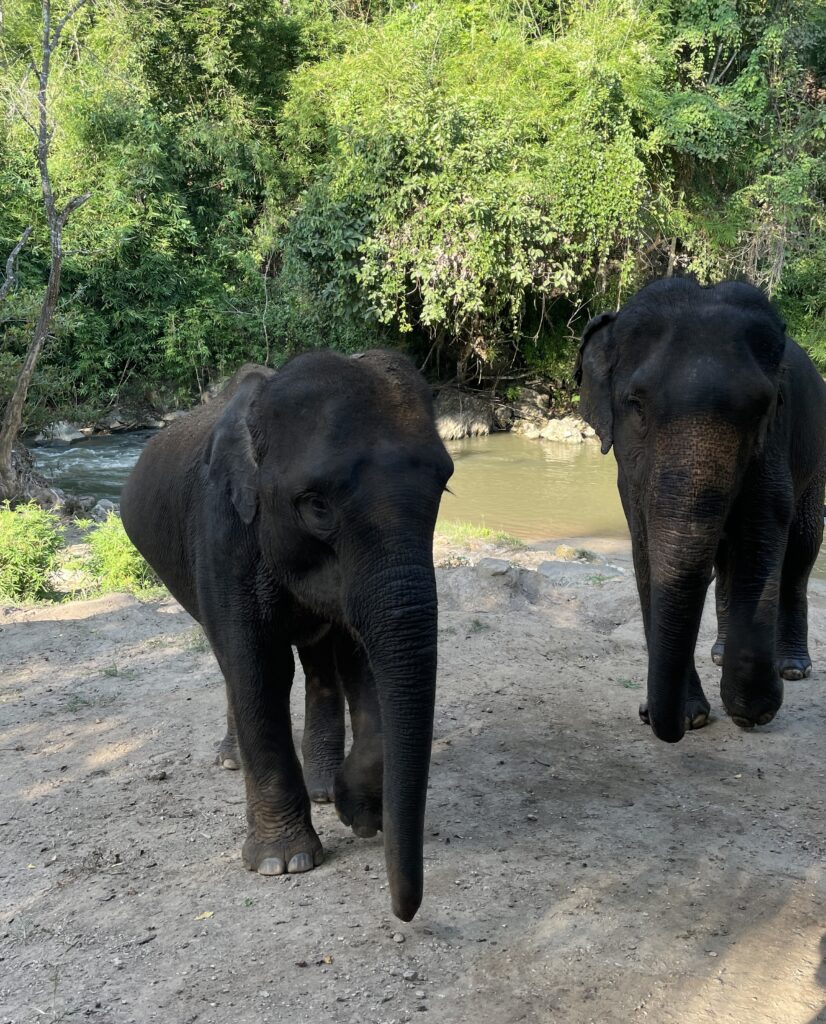
Many first-time visitors are unaware that elephant riding, tiger selfies, and circus-style shows are often built on harsh training methods, the use of chains, and sedation. It looks “once in a lifetime” in photos, but it’s one of the quickest Thailand tourist mistakes you’ll regret later.
Red flags to avoid: riding seats on elephants, handlers using bullhooks, animals performing tricks, tiger cubs being passed around for photos, or any opportunity to cuddle a big cat. Even “bathing the elephants” can be stressful if crowds rotate through them all day.
Instead, choose observation-only sanctuaries that offer no riding and no forced bathing, feature small groups, provide ample space for animals to roam, and have a clear mission to rescue rather than breed for tourism.
Read recent reviews, check the welfare policy on their website, and email direct questions before booking.
One more note: the word ethical gets used loosely in marketing. Please do your own research, and if you’re unsure, ask in my Thailand Facebook Group for honest traveler feedback before making a choice.
Underestimating the Impact of Burning Season in the North
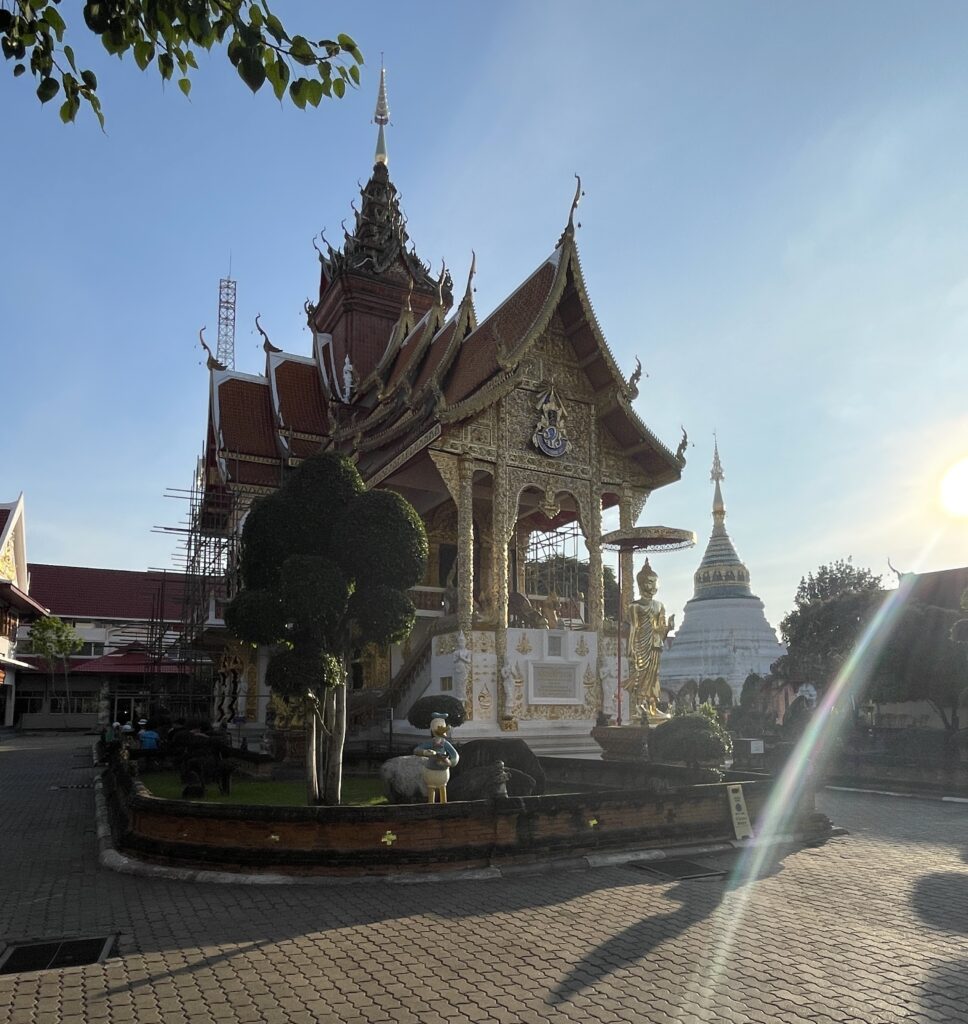
Many travelers underestimate the severity of the burning season in Northern Thailand. Between February and April, farmers burn crop residue, filling the air with smoke that lingers for weeks.
In Chiang Mai, especially, the air quality often ranks among the top five worst in the world during this time, meaning the air you breathe can reach toxic levels.
It’s not just a bit of haze; it affects visibility, comfort, and even health. Hiking, exploring temples, or simply enjoying cafés becomes harder when the air is thick with smog.
Masks like N95s help, but you’re still exposed overall, and it’s tough to avoid entirely if you’re there during the season.
If you are planning a trip during these months, make sure to check daily AQI levels before heading out so you know how safe it is to spend long periods outside. Otherwise, visiting outside of the burning season lets you actually enjoy Northern Thailand for all it offers!
Not Researching Beach Seasons
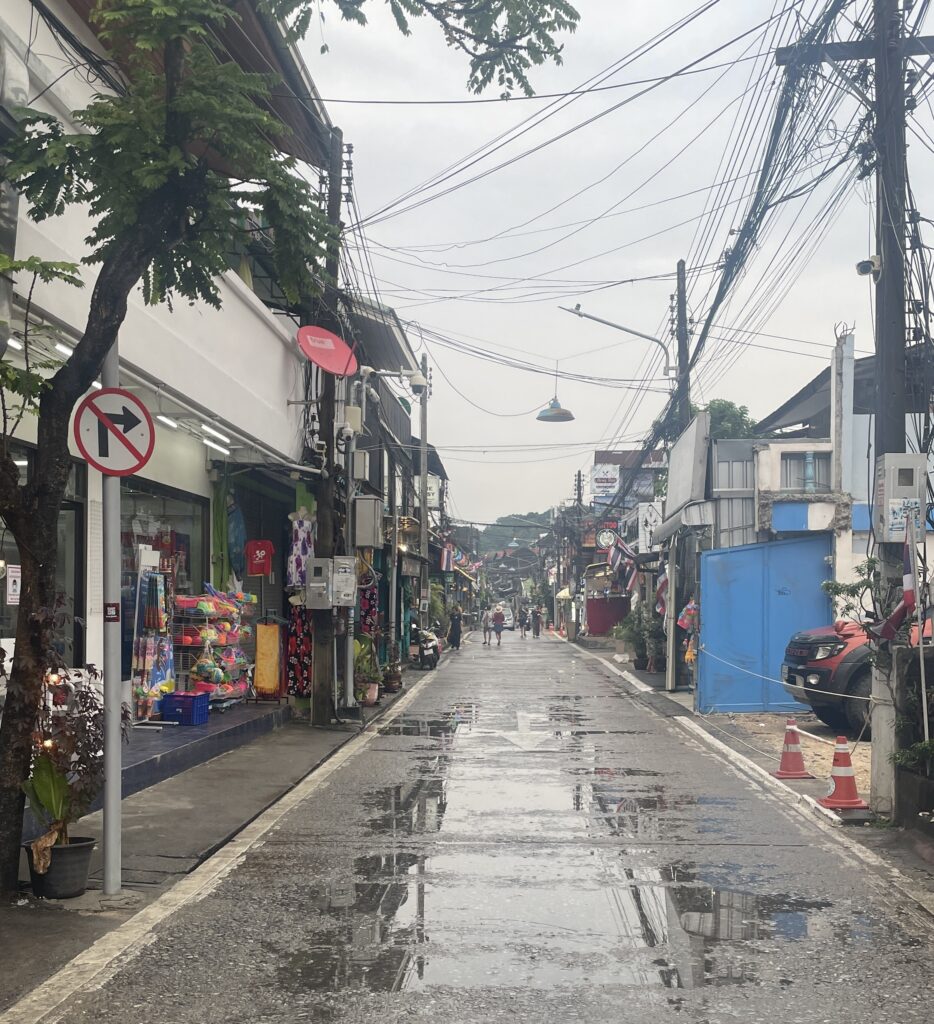
One of the biggest mistakes tourists make in Thailand is not realizing that the country’s beaches follow different seasonal patterns.
The Andaman Coast (Phuket, Krabi, Phi Phi) and the Gulf Coast (Koh Samui, Koh Phangan, Koh Tao) have opposite rainy seasons.
That means while one side may be sunny and perfect for island-hopping, the other can be stormy with rough seas and closed ferries.
Many travelers show up expecting year-round paradise, only to find red flags on the beach or boat tours canceled for days. This can be avoided with a bit of planning.
Do your research ahead of time, and align your island plans with the most ideal time to visit Southern Thailand so you don’t waste precious beach days stuck indoors.
Staying in Party Zones Without Realizing It
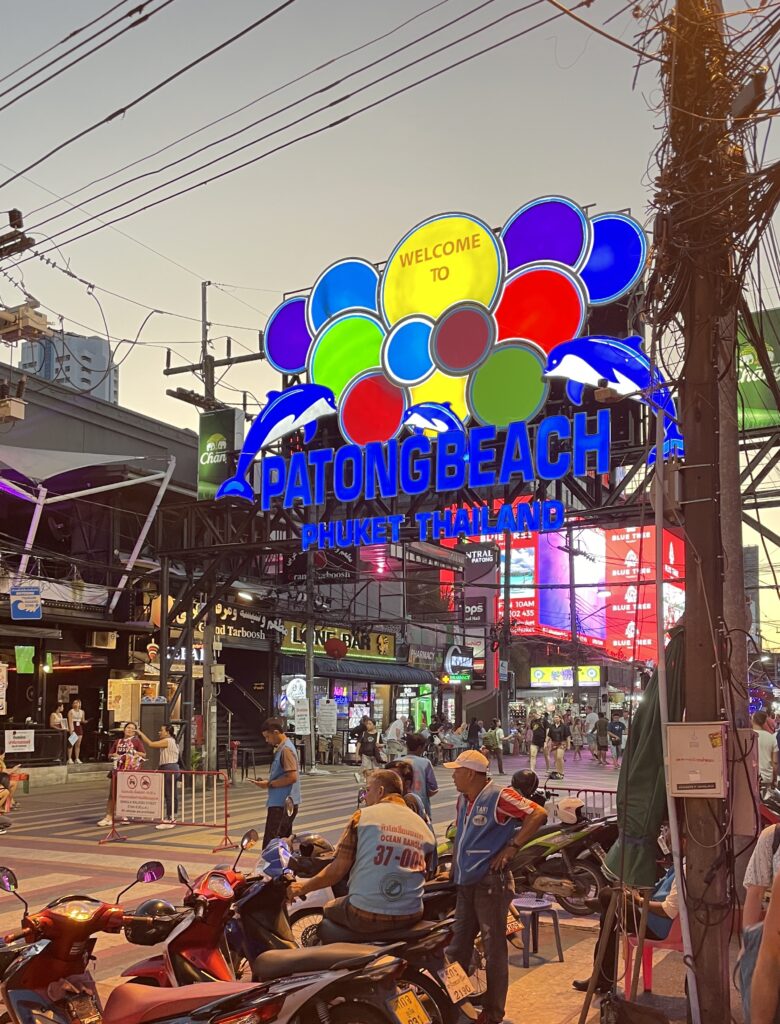
One of the easiest Thailand tourist mistakes to make is booking a hotel in the middle of a party zone without realizing it.
Online listings might highlight “close to nightlife” as a perk, but if you’re not looking to be kept awake until 3 a.m. by thumping bass, you’ll regret it fast.
This mistake happens a lot in Phuket, where visitors unknowingly stay in Patong Beach expecting calm, only to find themselves surrounded by neon lights and booming clubs.
The same goes for Ao Nang in Krabi, which has a reputation for being a party hub, while quieter alternatives like Klong Muang or Railay offer a totally different vibe.
These areas are also among the more Thai locations for traveling with children, where peaceful beaches and relaxed evenings are the norm.
Before booking, research the exact neighborhood, not just the island or city, and ensure it aligns with the type of trip you want.
Party zones can be fun if that’s what you’re after, but if you’re looking for relaxation, you’ll want to choose accommodation away from the main nightlife strips.
Booking Tight Connections Through Bangkok
Bangkok has two airports, Suvarnabhumi (BKK) and Don Mueang (DMK). Many international flights use BKK, while most low-cost domestic flights use DMK.
Add Bangkok traffic, long immigration lines, baggage collection, and tight connections, and one of the easiest mistakes for tourists in Thailand becomes one of the most common.
Play it safe with generous buffers, especially if you booked separate tickets that will not be protected by the airline.
If you’re following a two-week Thailand itinerary, the last thing you want is to lose a day to a missed flight. Planning extra time around connections will help keep your trip smooth.
Safer timing guidelines
- Same airport, separate tickets: allow yourself 4 hours to collect your bags and recheck.
- Switching airports BKK ↔ DMK: plan 5 to 6 hours minimum, or overnight if you can.
- Avoid the last flight of the day from the islands if you have an international connection.
Pro tips: double-check the airport code on every ticket, avoid peak rush hour transfers when possible, and consider arriving in Bangkok the night before your long-haul flight. A relaxed buffer costs less than a missed connection.
Not Booking Island Stays in Advance During High Season
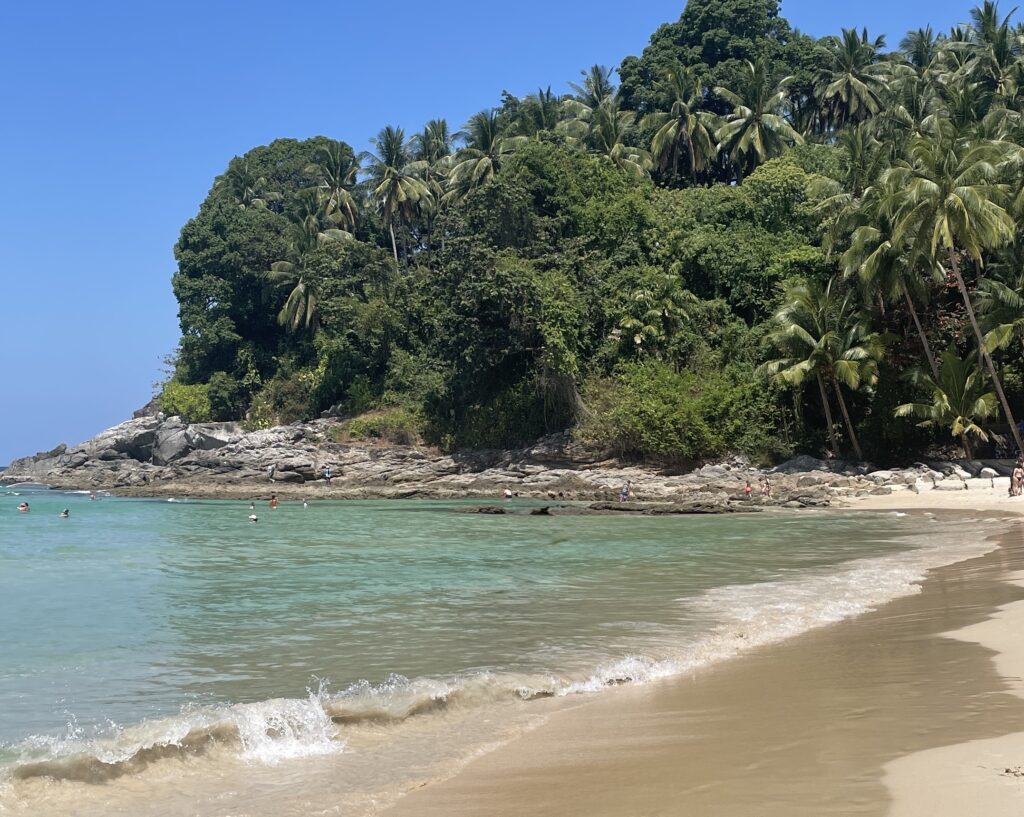
November to March is peak season on Thailand’s islands, with the absolute crunch around Christmas, New Year, Chinese New Year, and Songkran.
Popular spots like Phuket, Koh Samui, Koh Lipe, and Phi Phi fill fast, and the best-value beachfront rooms go first. Leave it late and you’ll either overpay or end up far from the beach.
By the way, if you’re planning a couple’s trip, the romantic places in Thailand beachfront hotels get booked many months in advance!
Another reason to plan with a clear breakdown of Thailand travel costs in mind.
- Book cancellable rates 4–8 weeks in advance for December–March, or earlier for holiday weeks.
- Prioritize location over amenities. A simple room steps from the sand beats a nicer place miles away.
- January and February are the busiest booking months in Southern Thailand
Staying Too Long or Too Short in Bangkok
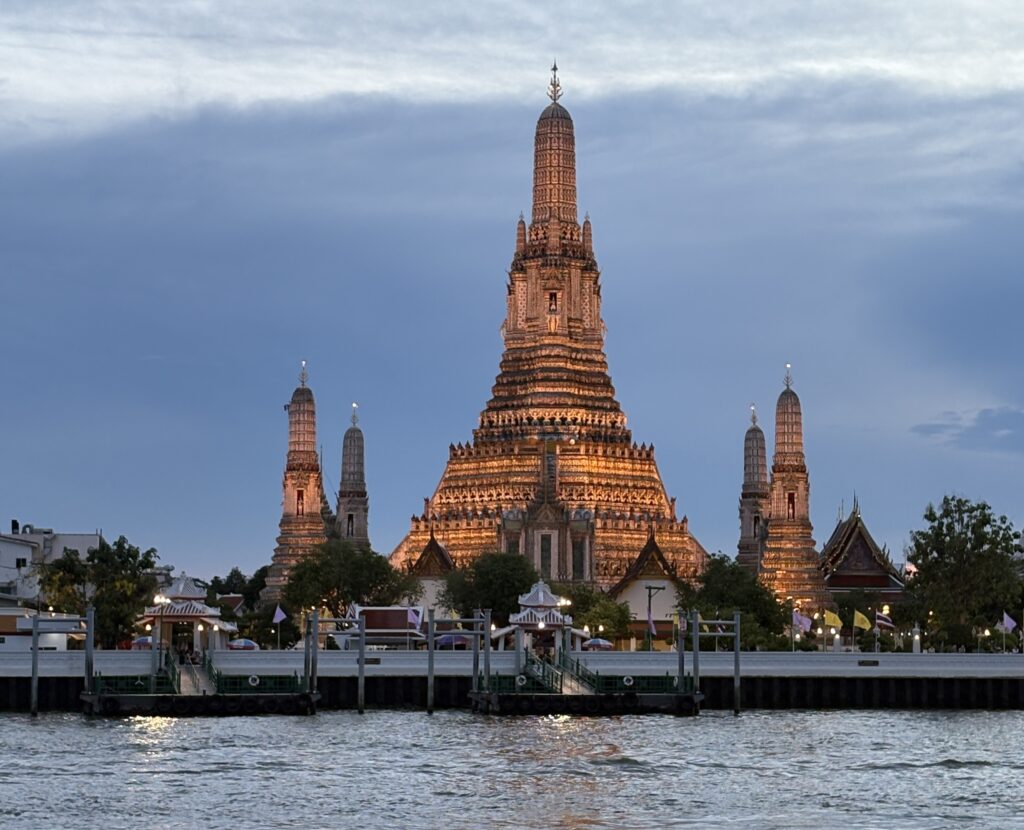
A common mistake is underestimating the amount of time to spend in Bangkok. Some travelers barely stop here, rushing through temples and markets before heading to the islands. Others stay too long and wonder why they missed Thailand’s beaches or the north.
Bangkok is massive, full of culture, street food, nightlife, and neighborhoods that all feel different.
It deserves more than a quick stop, but a whole week can be overwhelming unless you’re an actual city person.
For most visitors, two to four full days is ideal. If you’re planning 4 days in Bangkok, you’ll have time for the big sights, local neighborhoods, and still keep the pace comfortable.
A smart approach is to spend a night or two when you land to shake off jet lag, then another before flying home. Base yourself near the BTS or MRT to avoid traffic.
Consider combining a visit to the Grand Palace and Wat Arun with a trip to Chinatown or Ari, and leave space for a night market and a massage.
Going to Phi Phi Just for a Day Trip
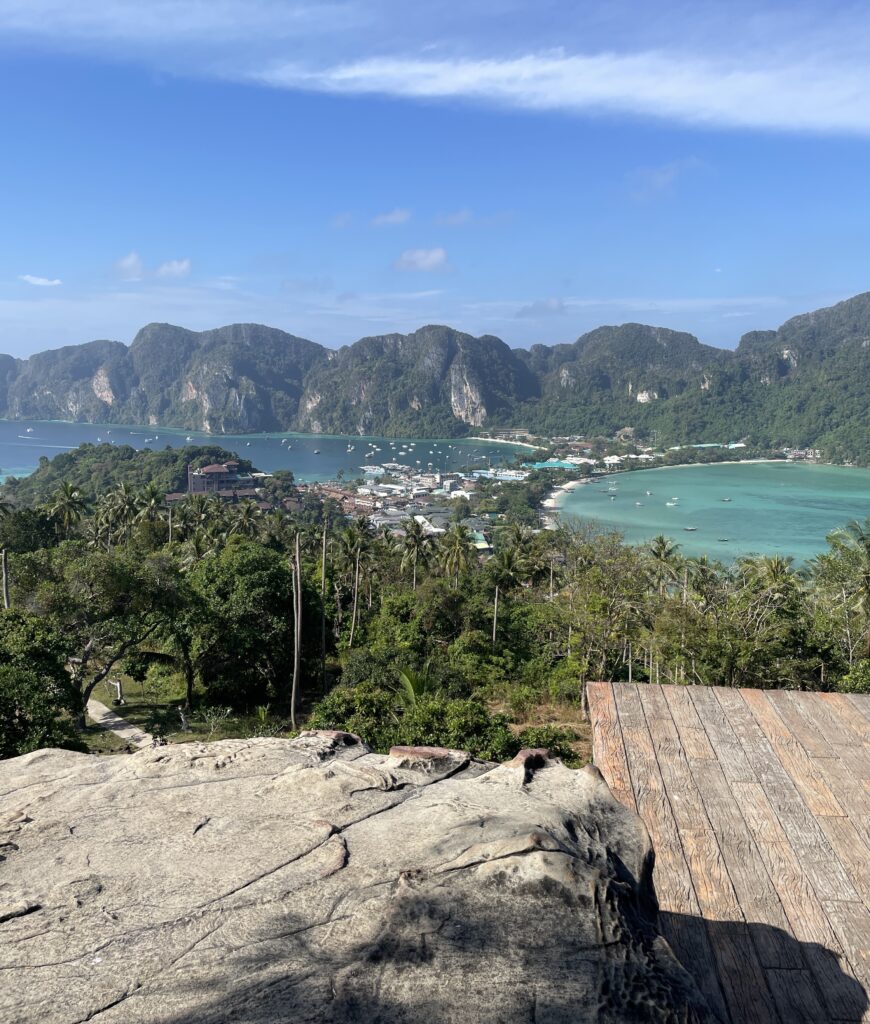
Another mistake many tourists make is visiting Phi Phi Islands only as a rushed day trip from Phuket or Krabi.
On paper, it sounds convenient, but in reality, you’ll spend most of your time in transit, crammed on speedboats, dealing with crowds, and only getting a brief glimpse of the beaches.
By the time you arrive, it’s already packed, and you’re leaving just as the best light and atmosphere set in.
The Phi Phi Islands deserve at least one overnight stay. Spending a night means you’ll see the islands after the day-trippers leave, when the beaches are quieter and the water feels more relaxed.
You’ll also have time for the famous Phi Phi viewpoint hike, where you can catch sunrise or sunset without the chaos of the midday crowds.
If your schedule is too tight for an overnight, it may be better to skip Phi Phi altogether and focus on other islands nearby that are easier to enjoy without the rush. If short on time, consider skipping Phi Phi in favor of nearby islands like Koh Yao Yai.
Booking Tours Without Reading Reviews
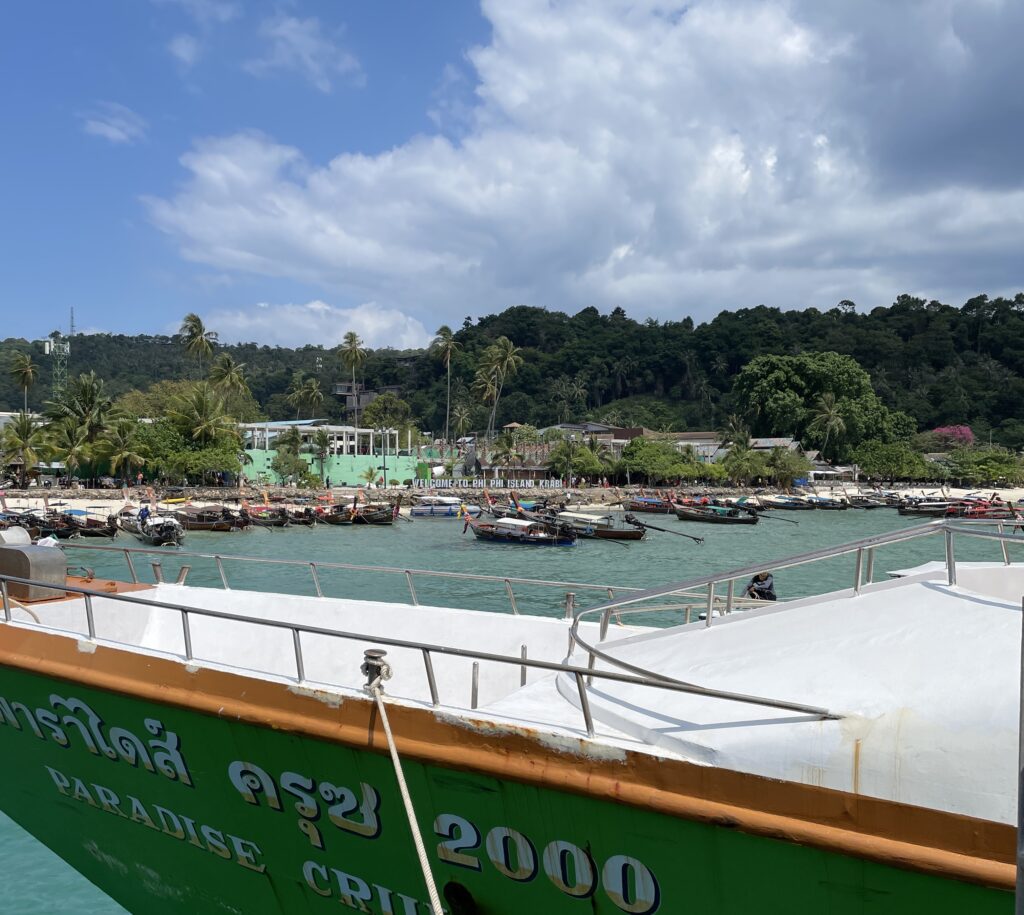
Thailand is full of tours, from island-hopping boats to cooking classes and elephant sanctuaries, but one of the easiest mistakes is booking without checking reviews.
Too many travelers sign up through a hotel desk or random kiosk and end up crammed on a poorly run trip, or worse, supporting businesses that are not ethical.
A little research goes a long way. Always check reviews on platforms like Google or travel forums before you hand over your money.
Better yet, use trusted booking sites like Viator or GetYourGuide, where you can compare operators and read feedback from other travelers. It is not just about comfort. While you’re at it, check out all the apps for Thailand I recommend downloading.
Reviews will tell you if the boats are overcrowded, if safety standards are met, or if the experience lives up to what is advertised.
This is especially important with activities involving animals, such as elephant sanctuaries or tiger temples. Some operators brand themselves as ethical, but unfortunately, they are not.
Relying on Western Food
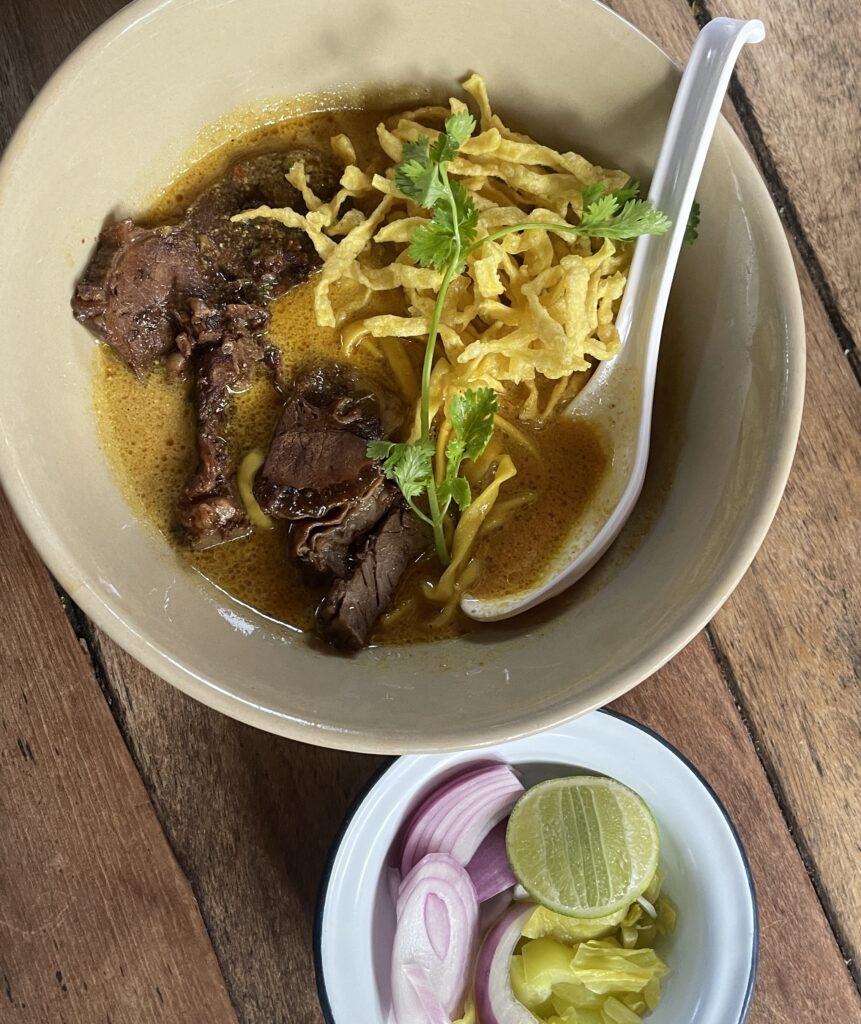
Thailand is a tourist-friendly country where Western food is readily available. It is there to cater to visitors, but one of the biggest mistakes is leaning on it too much.
Do not be the traveler who comes all the way to Thailand only to eat pad thai every day or stick with pizza and burgers.
Of course, you might crave a burger here or there, and that is fine, but do not let it define your trip. This is the time to expand your horizons.
Thailand’s cuisine is one of the highlights of the country, from street food to regional specialties like khao soi in the north or fresh seafood in the south. Check out this guide on Thai dishes you must try to get ideas beyond the basics.
Eating where the locals eat is often cheaper, fresher, and an integral part of the experience. If you are concerned about food safety, choose busy stalls with high turnover and meals served hot.
With a little common sense, you can dive into Thai food confidently and discover flavors you would never get back home.
Not Staying Overnight in a More Local Area
Many travelers base themselves only in the main tourist strips and never see where people actually live.
Spend at least one night in a more local neighborhood, and the trip changes: dawn markets, quieter temples, authentic neighborhood eateries, and calmer evenings.
You’ll spend less, meet more locals, and remember more than bar streets and souvenir rows.
In Bangkok, consider staying in Thonburi or Ari instead of only Khao San or lower Sukhumvit. In Phuket, try Old Town rather than Patong.
Around Chiang Mai, stay in Wat Ket or make a quick escape to Chiang Dao. On Koh Samui, Nathon or Mae Nam feels more local than Chaweng. One local night in each region reveals Thailand beyond the tourist façade.
Getting Tattoos or Braids in Tourist Zones
I get it, you come to Thailand and want a tattoo that will always remind you of the trip. I have tattoos myself, and I understand the appeal.
That being said, Thailand’s sun is no joke. You will likely be outdoors a lot, especially during the dry season, and fresh tattoos can burn badly. I’ve seen some nasty sunburns over new ink that not only hurt but also damage the tattoo in the long term.
Beyond the sun, another issue is quality. Some tattoo shops in tourist party strips, such as Khao San or Bangla Road, cut corners on hygiene and artistry.
You might end up with something rushed, infected, or just poorly done. If you do want a tattoo here, research licensed studios with good reputations. Thailand has incredible artists, but you won’t find them at the cheapest walk-in stands.
As for braids, they are not traditional to Thailand, and in tourist areas, they are overpriced and can cause damage to your hair. It may seem fun in the moment, but most travelers regret it later.
Petting or Taking Photos With Monkeys
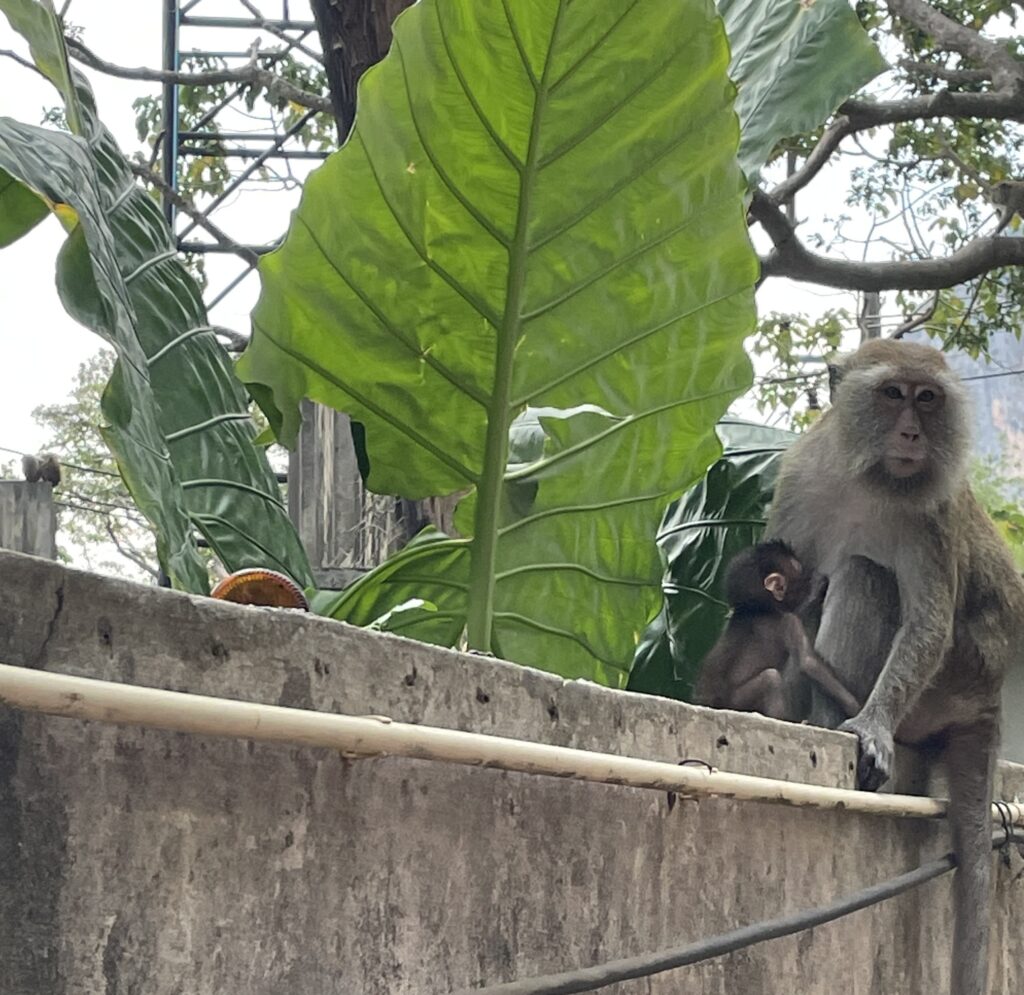
It might seem harmless or funny to feed a monkey or snap a selfie with one on your shoulder, but this is a mistake many travelers regret.
Monkeys in Thailand are not tame pets; they are wild animals that can bite, scratch, and carry diseases such as rabies.
At the end of the day, if you get scratched or bitten, you will need to go straight to a hospital for a rabies shot. That is non-negotiable if you do not want to gamble with your life. So why put yourself in that situation at all?
Avoid holding food or plastic bags, and keep a safe distance. Even the calm-looking ones can turn aggressive in an instant.
Enjoy watching monkeys at places like Lopburi or seaside temples, but do it from a safe distance. Treat them as the wild animals they are, not photo props, and you will protect both yourself and the animals.
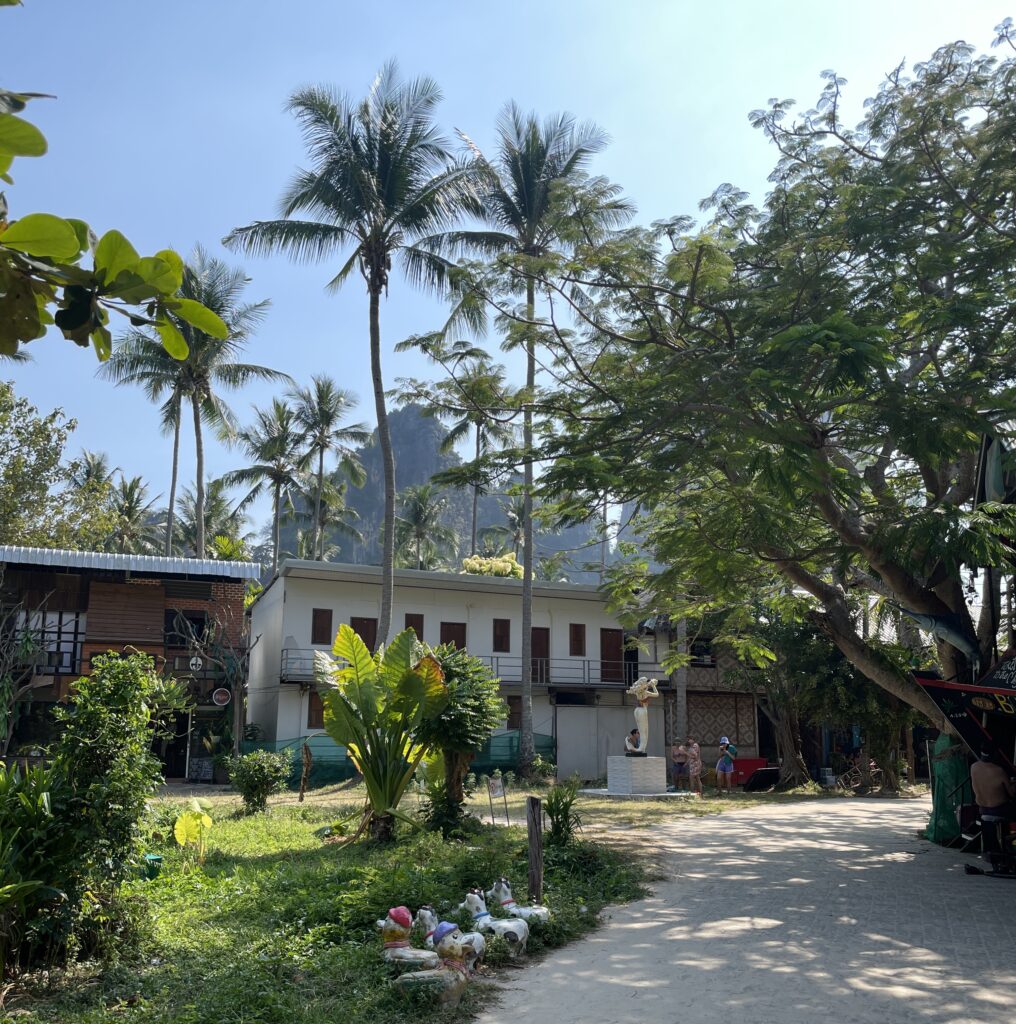
Final Thoughts on Thailand Travel Mistakes to Avoid
Thailand is one of the most rewarding countries to visit, but it is easy to fall into the same traps that many first-time travelers make.
From rushing through Bangkok or Phi Phi to eating only Western food, getting a tattoo in the wrong place, or getting too close to monkeys, these mistakes can take away from the experience you came here for.
A little awareness goes a long way. Plan your time wisely, research tours thoroughly before booking, and remain open-minded when it comes to food and culture.
If you are preparing for your trip, be sure to read these travel tips for Thailand and my guide on what not to do in Thailand, so you can avoid common pitfalls and enjoy Thailand the way it is meant to be enjoyed.
The best trips strike a balance between planning and curiosity. Respect the culture, try new things, and give yourself space to slow down.
Thailand has more to offer than you can ever fit into one visit, and that is precisely what makes it worth visiting multiple times. Lastly, be aware of a few common scams in Thailand.
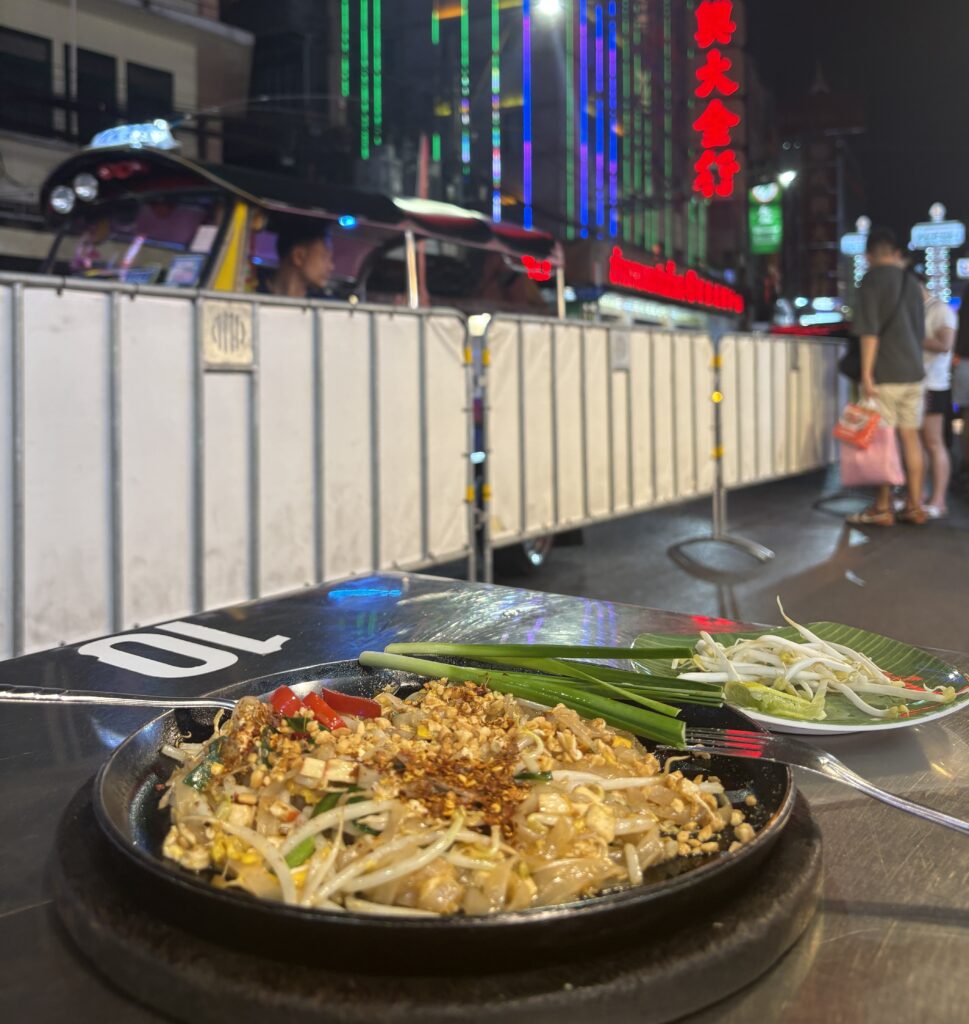
What should tourists avoid doing in Thailand?
Tourists should avoid common mistakes like rushing through Bangkok, eating only Western food, booking tours without reading reviews, or getting too close to monkeys.
Many visitors also regret getting cheap tattoos in tourist zones or spending all their time on overcrowded islands. A little research and awareness will help you avoid these pitfalls and enjoy a more authentic trip.
Is bargaining in Thailand a mistake?
Bargaining is part of the culture at markets and with street vendors, but many tourists either overdo it or skip it altogether.
A friendly negotiation is expected, but pushing too hard can be seen as rude. Smile, counter politely, and know when to accept a fair price.
Is visiting elephant rides in Thailand a mistake?
Yes, riding elephants is considered unethical and harmful to the animals, yet many tourist operators still promote it.
A mistake is supporting these attractions without realizing the impact. Choose reputable sanctuaries that focus on rescue and care rather than rides or shows.
Is drinking alcohol in public allowed in Thailand?
Many tourists are surprised to learn that drinking alcohol in public spaces like streets, parks, and transportation is restricted in Thailand.
It is also banned during certain holidays and election periods. A common mistake is ignoring these rules and facing fines. Stick to bars, restaurants, or private spaces.

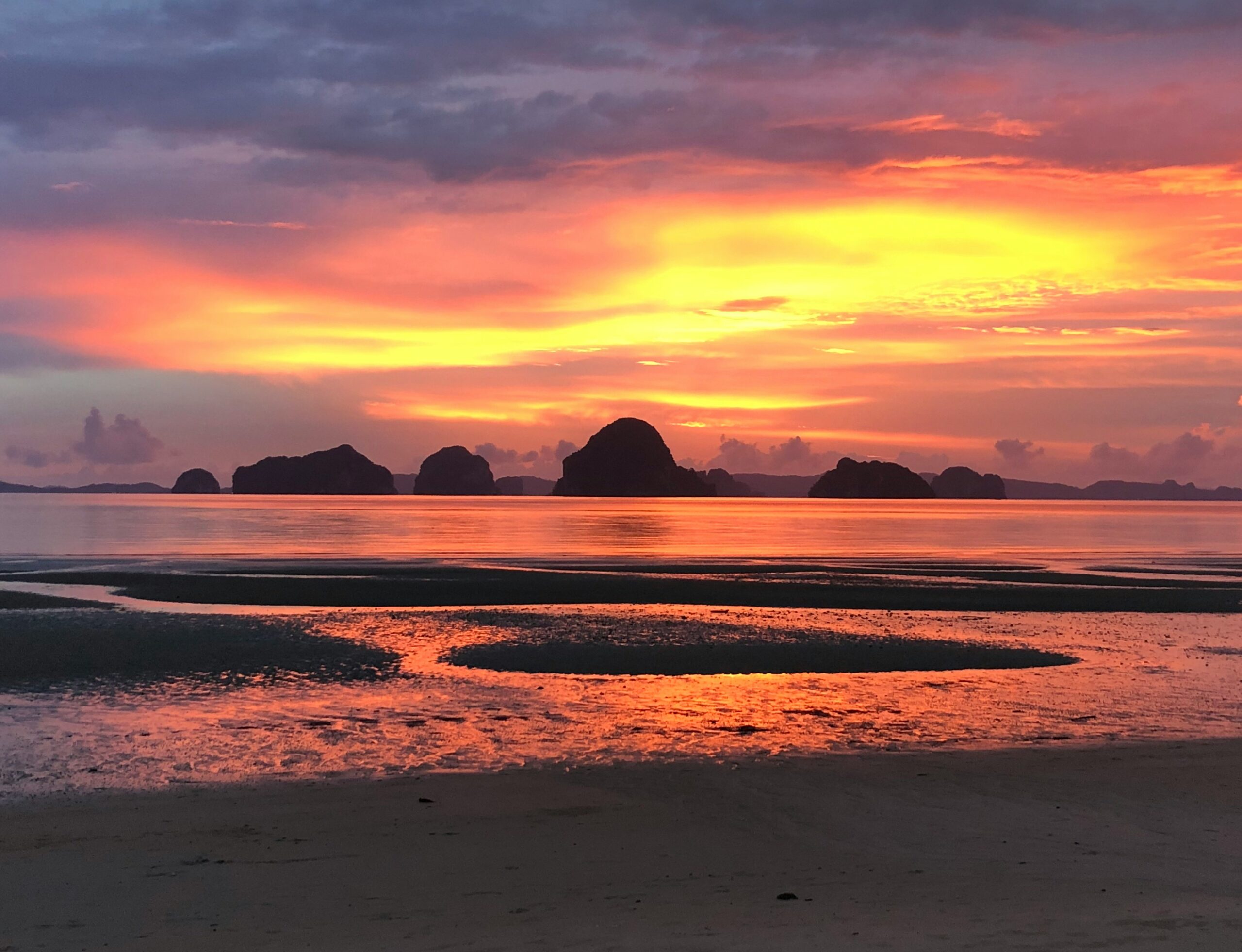
I am so happy I have came across your blog, it is helping my a lot to plan my trip to Thailand. I love your FB page too. Thanks for your time
This comment made my day!! Thank you so much for your kind words, I’m happy you’ve found it useful. I’m going to assume you mean my FB Thailand group? Or maybe it is my FB profile 🙂
I have had quite a few visitors in Thailand that underestimate the strength of the sun even after being warned. It’s not only new tattoos that get burnt.
You’re right, but tattoos are critical due to being considered open wounds when you get them! – Thanks for commenting Steve
You should do a Pro & Con regarding renting motor scooters in Thailand.
I think that would be a really good topic…
Thanks for your wonderful info.
I been to Thailand 3 times from the USA. Stayed in the North to the South.
You are right on!
RG
Soon to come, THANK you for your kind words Ronnie 🙂